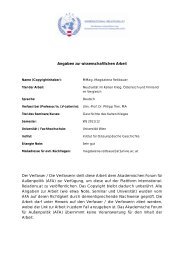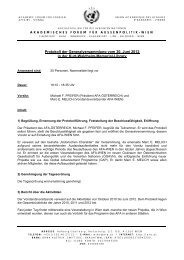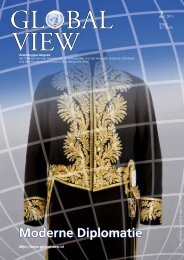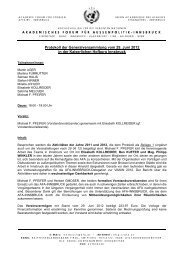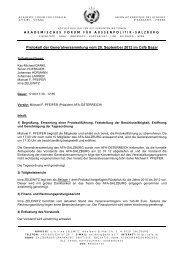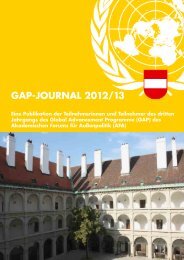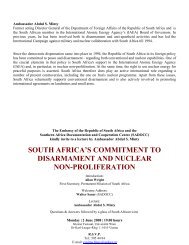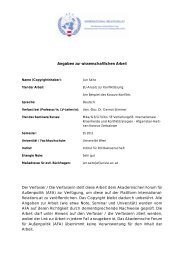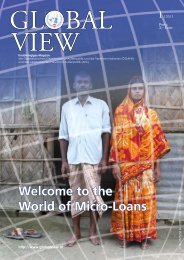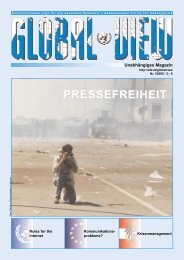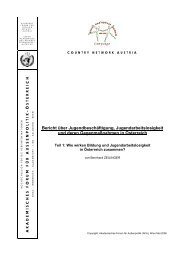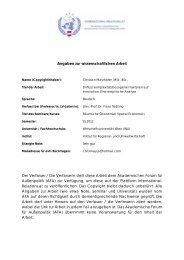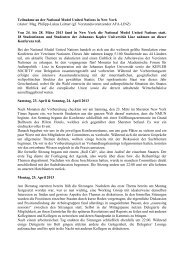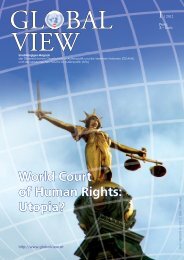Erfolgreiche ePaper selbst erstellen
Machen Sie aus Ihren PDF Publikationen ein blätterbares Flipbook mit unserer einzigartigen Google optimierten e-Paper Software.
14 International<br />
Access to Medicine in theDeveloping World<br />
The Millennium Development Goal 8pursues the achievement ofuniversal access to affordable and essential drugs<br />
in developing countriesby2015. Generic drugs seemtobeasolution, but regulating the production bearsproblems.<br />
Text<br />
Alina Schmidt<br />
Improving accesstomedicine is fundamentalto<br />
providing people in needwithfull and effective<br />
treatment and reducing the spread ofdiseases<br />
in the developing world. The lack of access can<br />
have many reasons, but unaffordability of drugs<br />
is the most common one in poor countries. The<br />
governments of developing countries are often<br />
only able to afford older generations of drugs<br />
that have gone "off-patent" and are therefore<br />
more cheaply available in the form of "generic"<br />
copies, but which aremuch less effectivethanthe<br />
newerdrugs.<br />
Forexample, in the treatmentofAIDS, which is a<br />
major human problem and has severe economic<br />
impacts in many developing countries, the available<br />
first-line drugs areoftenconnectedwith toxic<br />
side effects and rapidly become ineffective as<br />
the disease builds resistance. The newer secondline<br />
drugs thatare needed to continue treatment<br />
are uptosix times more expensive. Asaconsequence,<br />
patients are denied essential treatment<br />
or fall into poverty by attemptingtobuy the new<br />
medicines out of their own pocket.<br />
Pharmaceutical interestsvs. human rights?<br />
In order to improve this situation itisessential<br />
to find acommon ground between the need for<br />
pharmaceutical companies to recoup the cost of<br />
their research, development and licensing activities<br />
and the need from the developing world<br />
for access toaffordable medication. History has<br />
consistently shown that the price ofdrugs falls<br />
sharply whengenericcompetitorsenter the market,<br />
and at the same time, the availability of drugs<br />
increases. However, these generic competitors<br />
are only able toprovide such low prices because<br />
theydonot have expensesfor drug discoveryand<br />
efficacy trials. Yet, without such expenses, no new<br />
drugswould ever be developed.<br />
TheTRIPS agreementand itsimpact<br />
This tension was highlighted when the Agreement<br />
on Trade-Related Aspects of Intellectual<br />
Property Rights (TRIPS) was implemented. TRIPS<br />
GLOBAL VIEW 3/2011<br />
Generic drugs often provide the only available yetless effectivemedication forpeopleindeveloping<br />
countries. Profit interestsofthe pharmaceuticalindustryplayanimportant role.<br />
enforced patent rights, sharply curtailing the unlawful<br />
production of drugsthatare still subject to<br />
patent. Although it reduced piracy, TRIPS caused<br />
huge price disparities between older and newgeneration<br />
medicine, exacerbated the access<br />
gap between people in wealthy and developing<br />
countries, and raised moral issues regarding the<br />
balance between pharmaceutical industry profits<br />
and the health of billions of people.<br />
Voluntary and compulsorylicensing<br />
TRIPS attempts to address this issue with two<br />
possibilities for developing countries to create<br />
generic drugs: Firstly,"voluntary licensing"allows<br />
national governments to request aproduction<br />
license from apatent holder in case of apublic<br />
health emergency.Ofcourse, this depends on the<br />
"goodwill" of the patent holder and achieving an<br />
agreement canbetime-consuming,which lowers<br />
its effectiveness.<br />
Secondly, agovernment can issue a"compulsory<br />
license" for limited-scale generic production ifa<br />
patent owner abuses his rights by, for example,<br />
offering aproduct at atoo high price. Although<br />
this can behelpful, it cannot address the issue of<br />
large-scale production which is required for the<br />
supply of cheapdrugs.<br />
Patent pool –bestway forward?<br />
Asubsequent response to this challenge isthe<br />
UNITAID facility that was launched to purchase<br />
drugs totreat HIV/AIDS, Malaria and Tuberculosis,<br />
and which has a"patent pool" that allows<br />
various patented medicines to be produced generically<br />
at lower cost for poorer countries. The<br />
success ofthis approach has been helped by the<br />
many large pharmaceutical companies that have<br />
agreed to participate in the pool, but there is still<br />
morework to be done to achieve universal access<br />
to medicine.



